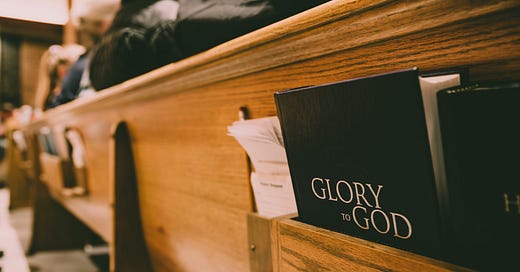
Why does worship matter?
When I was a kid and would travel down to Lousisiana to see relatives on my Dad’s side of the family, it was fascinating to see how the community shut down on Sundays. In the late 70s and early 80s, there were still some blue laws in effect that kept business either closed most of the day or all day Sunday. Even back home in Michigan I would go to one of the grocery stores on Sundays and there was a drape pulled down over the alcohol because you couldn’t sell it until noon.
The message back then was that Sundays were for worship and the culture responded by not making a lot of options available other than going to church. Times have changed. There are a lot more offerings that just being in church on a Sunday morning and so people aren’t always in church on Sunday. I remember hearing somewhere that people come to church on average a bit over once a month.
It’s in this changed climate that we have to ask why worship is important. Why does it matter for us to come to worship every Sunday?
I think for me, worship is an important way to connect with God and others. It is easy in the busyness of our lives to not feel connected to others. I savor the time before the pastoral prayer where we hear the concerns of the people within the community. It’s in that moment I feel connected to the people around me. Worship also reminds me that God is present. God is present beyond the worship service but it is in this time that I am reminded that God is alive and present in our world. God isn’t a concept of an echo of me in a larger voice, but the God of the universe that became one of us and brought us salvation.
A fellow pastor reminded me that worship is also spiritual disciplne. It is something that helps us grow in our faith, in our understanding of God. Christianity is at its root a relationship with the God of the universe and that can only be done by regular practice.
Hebrews 10:24-25 says “And let us consider how to provoke one another to love and good deeds, 25 not neglecting to meet together, as is the habit of some, but encouraging one another, and all the more as you see the Day approaching.” Worship is a way of finding out how to spur each other to grow in the faith and that only happens when we meet.
Being connected to a community of faith is incredibly vital especially in these days. It’s been reported over and over that some of the most strident supporters of former President Trump were people who didn’t go to church. They might have the language of faith, but the essence isn’t there. It’s quite common to see among working class adults that regular church attendance is rare. Russell Moore recently shared in Christianity Today the fastest growing segment of white evangelicals are those who seldom attend church. All of that can have serious consequences when it comes to issues like welcoming immigrants. Russell notes:
Unchurched evangelicals in the South not only keep their politics but also ratchet up to more extreme levels. They maintain the same moral opinions—except on matters that directly affect them (like having premarital sex, smoking marijuana, and getting drunk).
This category of lapsed and non-church-attending evangelicals are now, as Williams points out, the largest religious body in the South. They are also lonelier, more disconnected, angrier, and more suspicious of institutions.
Of course, there are many people who don’t attend church and are not like this. What I am saying here is that going to church on a regular basis can have wider impliations than just what you do.
Why do you go to worship? Or if you haven’t been to a church in a while, why don’t you? If you come to worship whether it’s here at First Christian in person or online or at another church, think about why you come to church and then take part in the singing of the hymns, in the prayers and in the sermon. Because that hour with God and with others change not only change your life, it might just change our world.



